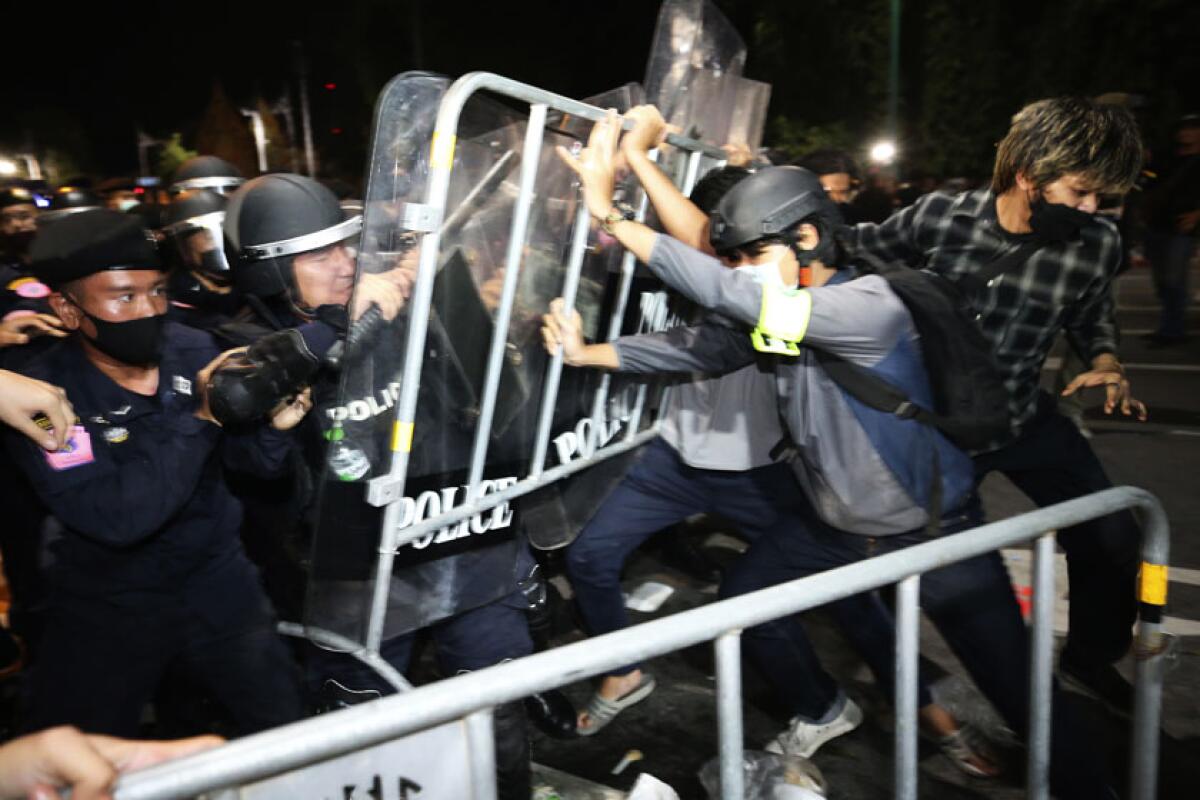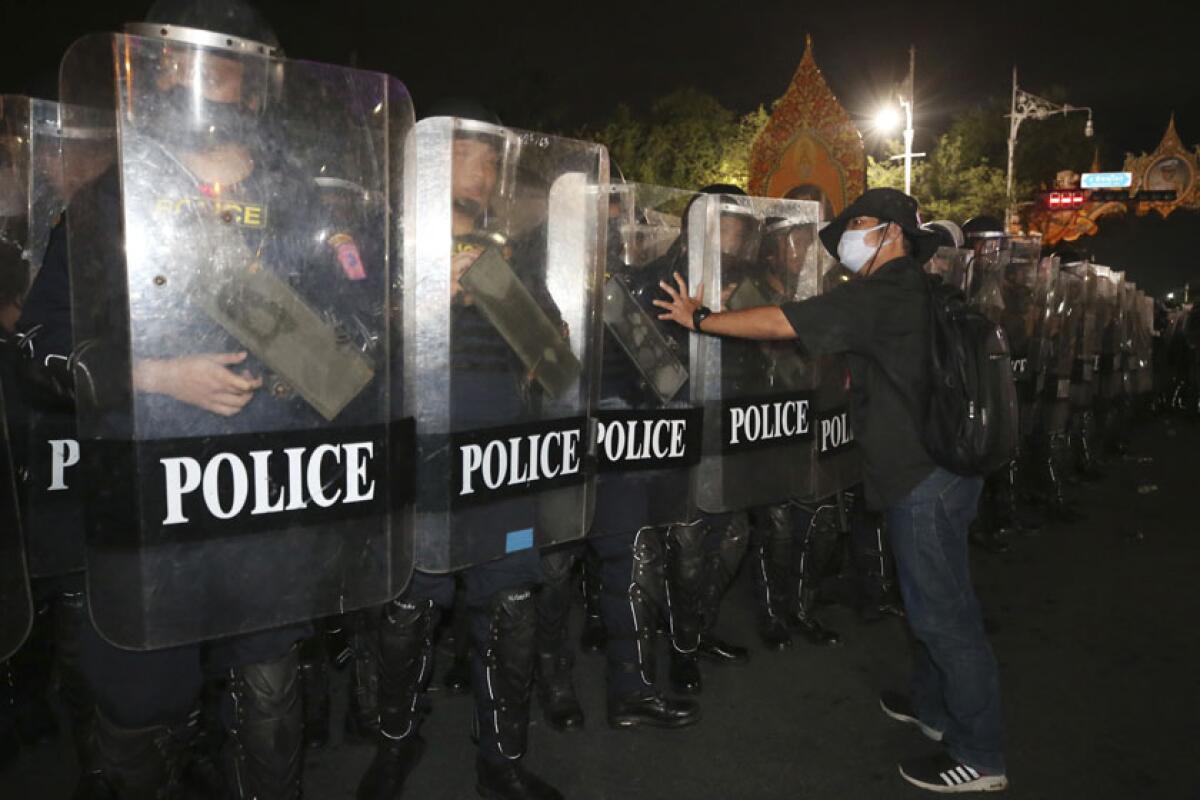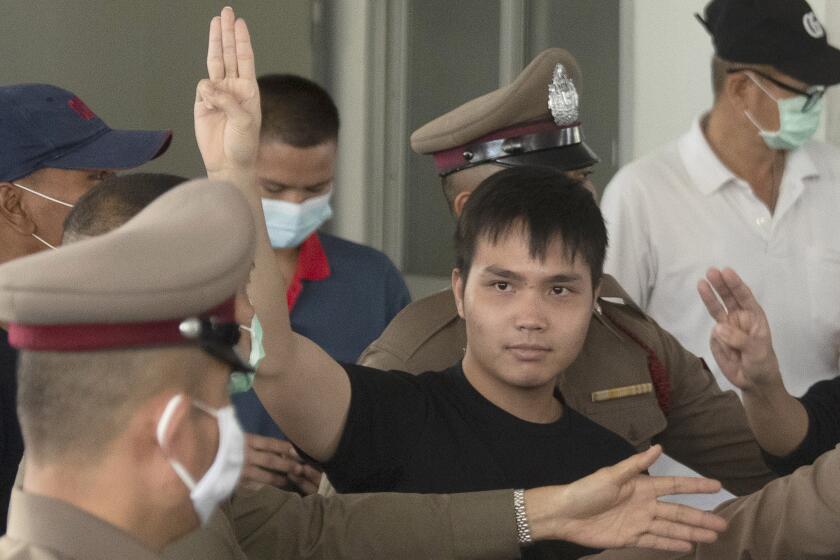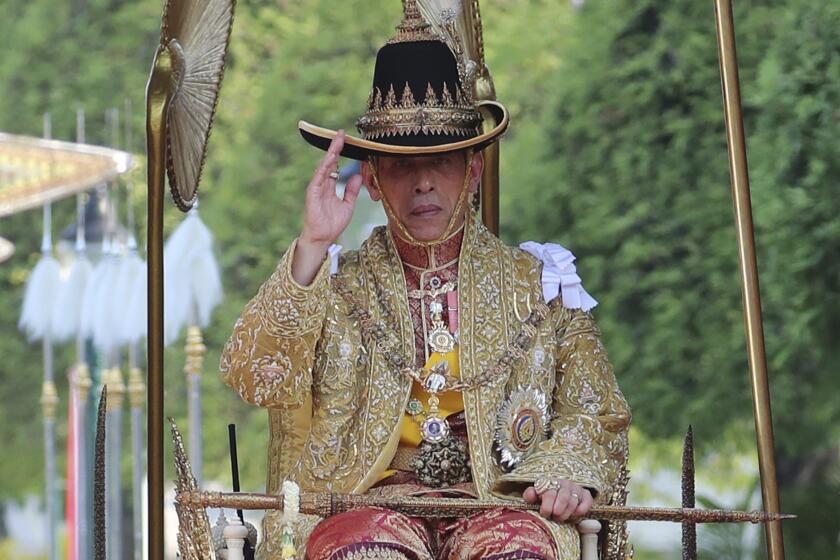Thailand declares state of emergency in Bangkok as police disperse pro-democracy protesters

- Share via
BANGKOK, Thailand — Thai police Thursday dispersed pro-democracy protesters who camped out overnight outside the office of the prime minister to demand his resignation, leading him to implement a “severe” state of emergency in the capital area.
An Associated Press journalist saw riot police advance from multiple locations to force out a few hundred protesters who remained outside Government House, the seat of Prime Minister Prayuth Chan-ocha. Protesters were seen taken away into police trucks.
Several top protest leaders were taken into custody, with one later declaring on his Facebook page that he had been denied access to a lawyer and was being forced onto a helicopter and taken to a city in the country’s north. Police said they had made 22 arrests.
The police operation came after Prayuth declared a severe state of emergency in the Bangkok area to allow authorities to move against the protests. It also came after demonstrators Wednesday heckled a royal motorcade, an extraordinary moment in a country where the monarchy has long been regarded as sacrosanct.
The text of the emergency declaration said it was needed because “certain groups of perpetrators intended to instigate an untoward incident and movement in the Bangkok area by way of various methods and via different channels, including causing obstruction to the royal motorcade.”
Despite a new ban on large public gatherings, as many as 1,000 people answered protest leaders’ calls to rally again in another area of the city later Thursday.
Tattep Ruangprapaikitseree and other young activists want to rein in the monarchy and its military allies who have ruled Thailand since a 2014 coup.
Before the police dispersal, a large number of protesters had already left the area after one of their leaders announced the end of the rally at Government House, though a few hundred stayed on. It was also announced that the rally would move to a different location in the capital Thursday afternoon.
The rally started Wednesday with thousands of protesters marching from Bangkok’s Democracy Monument to Government House. It was the third major gathering by activists who want to keep up the momentum in their campaign for democratic change.
The protesters have drawn attention because of their demands for reforms to Thailand’s constitutional monarchy, which they say does not properly operate in a democratic framework.
That demand has caused a huge controversy because the royal institution has long been considered a pillar of Thai identity. It is also protected by a lese-majeste law that mandates three to 15 years in prison for defaming the monarchy.
Conservative royalist Thais accuse protesters of seeking to end the monarchy, an allegation they deny. Before leaving Democracy Monument, several small clashes broke out between protesters and their opponents, who traded punches and threw plastic bottles as police tried to keep them apart.

The situation was complicated by King Maha Vajiralongkorn’s scheduled drive past the protest venue to attend a royal ceremony. That led to a moment, captured in photos and video circulated widely on social media, in which protesters appeared to gesture and shout just yards away from the royal motorcade. Such actions are unprecedented in Thailand, where those waiting for a royal motorcade regularly sit on the ground or prostrate themselves.
The king made a similar drive past the area on Tuesday after police cleared tents set up near the monument and arrested 21 people on minor charges.
Some experts say a line may have been crossed.
“What seemed to be a low-boil stalemate that the Prayuth government was managing with reasonable success has now, following the incident involving the procession of the queen’s motorcade down a street in which an active protest was underway and the arrests of protest leaders, become a full-blown crisis,” said Michael Montesano, coordinator of the Thailand Studies Program at the ISEAS-Yusof Isak Institute in Singapore. “Unlike even 48 hours ago, the country is in dangerous territory now.”
Thailand’s King Vajiralongkorn is facing demands for limits on his powers and public oversight of an estimated $70 billion in crown wealth.
Government spokesman Anucha Buraphachaisri announced Thursday morning that the prime minister had ordered police to take strict action against those who obstruct a royal procession or otherwise insult the monarchy.
Keeping order will be facilitated by the new emergency decree for Bangkok, which bans unauthorized gatherings of more than five people and gives authorities other powers they deem needed to prevent unrest, including detaining people at length without charge. It also outlaws the news that distorts information or could cause a “misunderstanding.”
Thailand is already under a national state of emergency as part of its efforts to fight the coronavirus, and it was not immediately clear how the new decree was different.
Protesters gathered again in a Bangkok shopping district Thursday afternoon and into the evening. The crowd grew big enough to block a major intersection flanked by upmarket malls and a famous shrine. A series of speakers denounced the government.
Police stood by while the crowd chanted rude slogans calling for the prime minister to step down. They also chanted, “Free our friends,” in reference to the arrested leaders.
“I want to fight for my future. I want to fight for my friends. I want to fight for my democracy,” said 24-year-old NGO worker Aitarnik Chitwiset. “My country must be [a] democracy.”
Breaking News
Get breaking news, investigations, analysis and more signature journalism from the Los Angeles Times in your inbox.
You may occasionally receive promotional content from the Los Angeles Times.
Deputy police spokesman Col. Kissana Phathanacharoen warned that calling for such a protest or attending one was against the law.
“You cannot say that they are not aware of the order. We are making it clear,” Kissana said at a news conference.
Human rights group Amnesty International criticized the crackdown. Its deputy regional director, Ming Yu Hah, urged Thai authorities to “engage in constructive dialogue with the protesters.”
“The scale of today’s early morning arrests seems completely unjustified based on yesterday’s events. The assemblies were overwhelmingly peaceful. These moves are clearly designed to stamp out dissent, and sow fear in anyone who sympathizes with the protesters’ views,” Amnesty said in a statement.
The protest movement was launched in March by university students but quickly put on hold as Thailand was gripped by surges in coronavirus cases. It came back in July, when the threat from the virus eased, and since then has again been spearheaded by students and publicized on social media.
The movement’s original core demands were new elections, changes to the constitution to make it more democratic and an end to intimidation of activists.
The protesters charge that Prayuth, who as army commander led a 2014 coup that toppled an elected government, was returned to power unfairly in last year’s general election because laws had been changed to favor a pro-military party. Protesters say a constitution promulgated under military rule is undemocratic.
More to Read
Sign up for Essential California
The most important California stories and recommendations in your inbox every morning.
You may occasionally receive promotional content from the Los Angeles Times.












